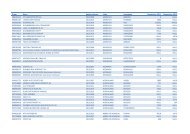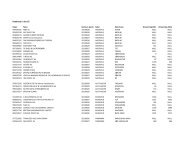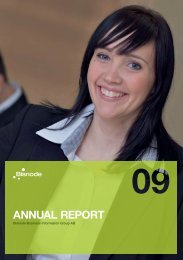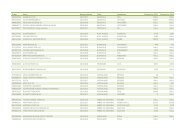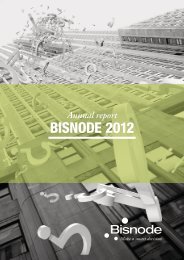Download PDF version - Bisnode
Download PDF version - Bisnode
Download PDF version - Bisnode
Create successful ePaper yourself
Turn your PDF publications into a flip-book with our unique Google optimized e-Paper software.
36<br />
accounTinG policies<br />
anD noTes<br />
note 1. General information<br />
<strong>Bisnode</strong> Business Information Group AB, with corporate identity number 556681-<br />
5725, is a subsidiary of Ratos AB, 556008-3585. The <strong>Bisnode</strong> Group is one of<br />
the leading providers of digital business information in Europe, with a complete<br />
offering of online solutions for market, credit and business information. The Group<br />
operates in 17 countries.<br />
<strong>Bisnode</strong> Business Information Group AB is a public Swedish limited liability<br />
company that is registered in Stockholm. The address to the head office is<br />
Sveavägen 168, S168, SE-105 99 Stockholm.<br />
The consolidated financial statements were approved by the board of directors<br />
and the CEO on 15 March 2011 and will be presented to the 2011 Annual General<br />
Meeting for adoption.<br />
note 2. summary of significant accounting policies<br />
The principal accounting policies applied in the preparation of these consolidated<br />
financial statements are set out below. These policies remain unchanged from the<br />
previous year unless otherwise stated.<br />
2.1 Basis for preparation<br />
The consolidated financial statements have been prepared in accordance with<br />
International Financial Reporting Standards (IFRS) as approved by the EU and with<br />
the standard RFR 1, Supplementary Accounting Rules for Groups, and the Annual<br />
Accounts Act. The consolidated financial statements have been prepared under<br />
the historical cost convention, as modified by the revaluation of available-for-sale<br />
financial assets and derivative financial instruments at fair value through equity in<br />
accordance with hedge accounting.<br />
All amounts are expressed in thousands of Swedish kronor (SEK thousands)<br />
unless otherwise stated.<br />
2.2 Changes in accounting policies and disclosures<br />
IFRS 3 – Business Combinations (revised)<br />
The revised standard is applied by the Group as of 1 January 2010. The revised<br />
standard has affected how business combinations are accounted for, i.e. the<br />
accounting treatment of transaction costs, contingent purchase consideration and<br />
business combinations achieved in stages. The revised standard has not had any<br />
impact on business combinations in previous year.<br />
IAS 27 – Consolidated and Separate Financial Statements (revised)<br />
The revised standard is applied by the Group as of 1 January 2010. The revised<br />
standard requires for instance that the effects of transactions with non-controlling<br />
interests be recognised directly in equity if control over the subsidiary is retained.<br />
The revised standard has affected financial statements in that transactions with noncontrolling<br />
interests have been recognised directly in equity instead of given rise<br />
to goodwill.<br />
2.3 Clarification of IFRS standards or interpretations to standards that are not<br />
yet effective and that will have a significant effect on future financial statements<br />
IAS 24 – Related Party Disclosures (revised)<br />
The revised standard clarifies and simplifies the definition of a related party and<br />
will be applied by the Group for periods beginning on or after 1 January 2011.<br />
When the revised standard is applied, it could lead to further information about<br />
related party transactions.<br />
2.4 Consolidation<br />
a) Subsidiaries<br />
Subsidiaries are all entities over which the Group has the power to govern the<br />
financial and operating policies generally accompanying a shareholding of more<br />
than one half of the voting rights. The existence and effect of potential voting<br />
rights that are currently exercisable or convertible are considered when assessing<br />
whether the Group controls another entity. Subsidiaries are fully consolidated from<br />
the date on which control is transferred to the Group. They are de-consolidated<br />
from the date that control ceases.<br />
The group uses the acquisition method of accounting to account for business<br />
combinations. The consideration transferred for the acquisition of a subsidiary is<br />
the fair values of the assets transferred, the liabilities incurred and any equity interests<br />
issued by the Group. The consideration transferred includes the fair value of any<br />
asset or liability resulting from a contingent purchase consideration arrangement.<br />
Acquisition-related costs are expensed as incurred. Identifiable assets acquired<br />
and liabilities and contingent liabilities assumed in a business combination are<br />
measured initially at their fair values at the acquisition date. On a acquisition-byacquisition<br />
basis, the group recognises any non-controlling interest in the acquiree<br />
either at fair value or at the non-controlling interest’s proportionate share of the<br />
acquiree’s net assets.<br />
The excess of the consideration transferred, the amount of any non-controlling<br />
interest in the acquiree and the acquisition-date fair value of any previous equity<br />
interest in the acquiree over the fair value of the Group’s share of the identifiable<br />
net assets acquired is recorded as goodwill. If this is less than the fair value of the<br />
net assets of the subsidiary acquired in the case of a bargain purchase, the difference<br />
is recognised directly in profit or loss as other operating income.<br />
Intragroup transactions, balances and unrealised gains on transactions<br />
between group companies are eliminated. Unrealised losses are also eliminated<br />
but are considered an indication of impairment of the asset transferred. Accounting<br />
policies of subsidiaries have been changed where necessary to ensure consistency<br />
with the policies adopted by the Group.<br />
b) Associates<br />
Associates are all entities over which the Group has significant influence but not<br />
control, generally accompanying a shareholding of between 20% and 50% of the<br />
voting rights. Participations in associates are accounted for using the equity<br />
method of accounting and are initially recognised at cost.



